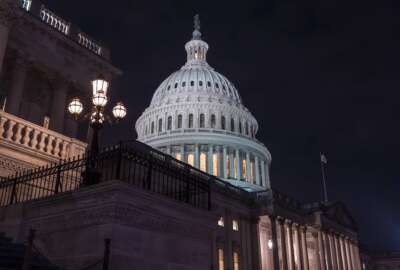Obama proposes $42.5B in cuts to employee benefits
President Obama wants federal employees to contribute more to their retirement plans as part of a $4.4 trillion plan to reduce the deficit over the next decade. The...
wfedstaff | June 4, 2015 11:48 am
President Barack Obama is seeking $42.5 billion in savings through reforms of the federal employee benefit programs as part of a plan to reduce the federal deficit by more than $4 trillion over the next decade.
The White House expects to save half of the $42.5 billion from changes to the civilian agency pension system.
The President recommends civilian employees would contribute 1.2 percent more of their paychecks to their retirement, to be phased with a 0.4 percent increase annually starting in fiscal 2013. A senior administration official defended the proposal. The official said it was much less harsh on employees than competing Republican measures, and it would still be more generous than the average private-sector retirement plan.
But one of the biggest federal unions say government workers have sacrificed enough already through a two-year pay freeze.
“Asking federal employees to accept additional cuts to their take-home pay is unfair, especially at a time when citizens are demanding more services from their government,” said American Federation of Government Employees president John Gage in a written statement.
AFGE estimated that an employee who makes about $47,500 would have to contribute $570 more to their retirement per year.
The National Treasury Employees Union noted that employees under the Civil Service Retirement System would miss out on the 3.1 percent payroll tax holiday that Obama has proposed for all workers.
Additionally, a new commission of lawmakers, union leaders, academics and members of the private sector would rethink federal policies and practices that govern employee compensation, training and performance evaluations. This follows the Obama administration’s ongoing effort to reform federal personnel practices, including hiring reform and performance management.
“It will be something that we’ll watch closely because more ideas–good or bad–about the federal workforce could come out of that,” said Kelley.
Obama asks military retirees to pay more for health care
The other half of the savings would come from changes to military retiree benefit programs.
The White House proposes changes to the TRICARE health plan for military retirees and families, including making recipients pay premiums and increased co-payments for medicine, similar to other health care plans. The President would leave further changes to military retiree benefits to a committee similar to the one used for the Base Realignment and Closure (BRAC) program.
“People came into the military under a certain set of expectations” said Robert Tobias, the director of key executive leadership programs at American University. “For many, they took less pay in return for an expectation of what they would get in retirement, so I think it will be hard for the president to ask Congress to implement that.”
Postal Service would get a reprieve from debts
As a short-term fix to the Postal Service’s cash problems, the administration would let it postpone a $5.5 billion payment to the Treasury until after the Congressional “supercommittee” that is tasked with reducing the deficit has proposed its plan, around Thanksgiving.
In the longer term, the government would return nearly $7 billion to the Postal Service that it has overpaid to the Federal Employee Retirement System. In addition, the plan would let the agency restructure its health benefit payments. Senior administration officials estimate that could save the struggling service about $20 billion.
Obama also endorsed letting the agency reduce delivery days from six to five per week, although not until 2013, and to appeal for greater flexibility in pricing.
“When you look at the proposal in its entirety, we’re extremely encouraged,” said Deputy Postmaster General Ron Stroman. “It provides us the type of breathing space that the Postal Service would need to enact many network changes and would give us the opportunity to reduce costs in the short term, and develop longer-term proposals to resolve our retiree health care benefits.”
The White House received quick support for USPS reforms from its allies on Congress.
“Not only does this proposal help the Postal Service fix its finances but it also reportedly trims our federal deficit by over $10 billion over the next 10 years,” said Sen. Tom Carper (D-Del.), who has proposed postal reform legislation. “What the President has put forward today appears to be a meaningful response to a very real and dire crisis that has the potential, perhaps in combination with other proposals that have been made in recent months, to address the challenges facing the Postal Service in the near term and in the years to come.”
But Republicans said Obama’s plan would cost taxpayers money. The Postal Service is not funded with taxpayer money.
“The accounting gimmicks used in the plan are a thinly veiled attempt to offset continued operating losses with a taxpayer funded bailout,” said Rep. Darrell Issa (R-Calif.), chairman of the Oversight and Government Reform Committee.
Issa has scheduled a markup Wednesday on legislation that he has sponsored. The bill would not let the Postal Service recoup any of the money that it has already paid to benefit plans.
But Obama stopped short of endorsing two controversial ideas put forth by the agency. The Postal Service wants to break union contracts so that it can lay off more than 100,000 workers. In addition, it wants to withdraw employees from federal benefits plans and create its own. A senior administration official said Obama would not support the first idea, and needed more time to consider the second, which may have implications for all federal workers in the plans.
Plan lowers cap on reimbursements for contractors’ salaries
Finally, the President’s plan addresses government contractor pay. Under the proposal, the government would restrict reimbursements for contractors’ top executives’ salaries to $200,000. The government currently spends about $160 billion a year on these reimbursements, which were capped at nearly $700,000 last year.
A senior administration official said the new cap would bring the government’s share of contractors’ salaries in line with what federal employees doing similar work make.
Industry groups are unhappy with the White House’s proposal.
“We strongly oppose the executive compensation cap proposal since it inappropriately ties company executive compensation to irrelevant government executive compensation levels,” said Stan Soloway, the president of the Professional Services Council, an industry association, in a statement. “In fact, the proposed compensation cap is not even the ceiling amount paid to government employees and has been consistently documented as being far lower than appropriate comparable compensation in the private sector. Relying solely on the government scale would place both government agencies and private sector companies at a significant disadvantage in the competition for talent.”
Soloway added the current executive compensation formula has been in place for 30 years and has been based on the compensation paid to executives at companies of similar sizes.
“Before arbitrarily capping the allowable cost amount, the government and industry should work together again on the long-overdue assessment of the current benchmark formula and update the benchmark formula as necessary,” he said.
RELATED STORIES:
” target=”_blank”>Federal-Postal Coalition warns against pay, benefits cuts
(Copyright 2011 by Federal News Radio. All Rights Reserved.)
Copyright © 2024 Federal News Network. All rights reserved. This website is not intended for users located within the European Economic Area.





